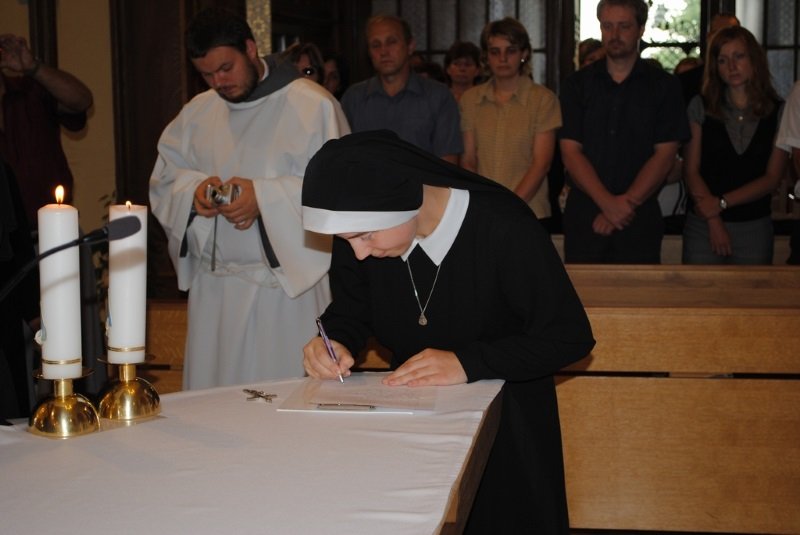Evangelical Counsels
The religious profession is a special consecration deeply rooted in the baptismal consecration and is a further expression of it. By Religious vows to keep the three evangelical counsels. They give themselves to God they love above all things without reserve, and unite themselves to the mystery of the Church in a new way: Life in Religious Family.
Our Life of Chastity
By the vow of chastity, relying on God’s word and help, we embrace a life of virginity of mind and body, preferring it to lawful marriage, so that we may attend to the things of God with an undivided heart and that by an evangelical sisterly life we may herald that communion in love that is to come.
By the vow of chastity we bind ourselves to total continence and to avoiding all that might impair chastity or tarnish the purity of heart.
Chastity for the sake of the kingdom of heaven is indeed a sign for the world and an incentive to love. It is a wonderful source of spiritual fruitfulness. It binds us with a lasting and exclusive bond to Christ and to our religious family, Sisterly love, on the other hand, through the vow of chastity, greatly contributes towards attaining a full and personal life.
Our Life of Poverty
We have deliberately chosen a life of poverty genuinely evangelical. The more shall we free ourselves from all earthly ties the better prepared shall we be for God and apostolate through service. By religious poverty not only we depend on our superiors in the use and disposition of things, but after the example of Christ, we aim at being poor in spirit and in fact.
Novitiate
Now that the day is near, it is an exciting transition that the postulant enters into. They have experienced the religious-community life for the set time and still sense the personal calling to the Consecrated Life. There is a simple private community ceremony planned and announced by our superior. For our order, it is usually the vigil of the Assumption. The room is readied. The readings from Scripture are prepared, the habit, white veil and constitution is set upon the table for her! What will her new name be? What will she look like? This is an incredibly exciting and serious new phase. The exterior symbols of the habit, the constitution and next two years are expressions of what is in our heart: God’s will be done.
2-year Novitiate
Our canonical year is devoted to the spiritual and religious formation of the Novice; we concentrate and focus on religious life and we devote our study and time to the spiritual formation of our order. Prayer is central to our lives. We do not work in our active apostolate at this time. We strive to live out the constitutions and directives.
The non-canonical Novitiate Year
We continue to learn practical religious life and the charism of our order. This year we are immersed into the apostolate again. We are gradually learning to balance contemplation and apostolate. We are preparing for the profession of Evangelical Counsels.
The Constitution of our Congregation are the instructions and advice on how we are to respond now to everyday life and to the demands and expression of God’s love which called us into our religious family. We are prepared for growth in virtue, prayer and self-denial. We learn to meditate, appreciate and understand the Liturgy of the Mass and the Divine office.
“Then Jesus said to his disciples, “Whoever wishes to come after me must deny himself, take up his cross, and follow me.”
Our Life of Obedience
By the vow of Obedience we offer to God the dedication of our own will, uniting it with greater steadiness and security to the saving Will of God, we want to show humble and respectful obedience to our superiors as God’s representative in all things that, directly or indirectly, pertain to the keeping of our vows, the rule, the constitution and the directions. By the vow of obedience we submit with filial love and devotedness to the Roman Pontiff as to our highest superior. We also show obedience to the bishops, submitting to their pastoral authority in diocesan churches.





